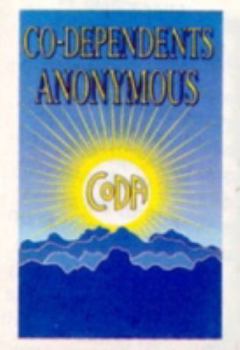Co-Dependents Anonymous
Select Format
Select Condition 
Book Overview
In Co-Dependents Anonymous, members apply the 12 Step principles to their daily lives, so it's not surprising that the book Co-Dependents Anonymous follows a format similar to that of the ""Big Book"" of Alcoholics Anonymous. The stories and principles it contains are uniquely pertinent to anyone coping with codependency and searching for freedom and peace.
Format:Paperback
Language:English
ISBN:0964710501
ISBN13:9780964710504
Release Date:July 1995
Publisher:CoDA Resource Publishing
Length:180 Pages
Weight:1.56 lbs.
Dimensions:5.5" x 1.2" x 8.5"
Customer Reviews
3 ratings
Old version
Published by Celia1968 , 9 months ago
Not the version I wanted
The "Big Book" of Codependents Anonymous
Published by Thriftbooks.com User , 16 years ago
Codependents Anonymous is a 12-Step recovery program for men and women whose common purpose is a desire for healthy and loving relationships. The program is based on the Steps and Traditions of Alcoholics Anonymous. The book is the basic text for the program, which has meetings throughout the United States and internationally. The first half of the book defines codependency and the program of recovery from codependence, while the second half of the book consists of personal stories of recovery. The book is one of many pieces of literature that the program offers, but is generally considered Codependents Anonymous's (CoDA's) "Big Book."
Codependence Through a 12 Step Lens
Published by Thriftbooks.com User , 17 years ago
Written anonymously by veterans of the "CoDA" 12 Step program that began in the late 1980s, the CoDA "big book" is strongly influenced by and in line with the object relations theory of psychodynamic and attachment theory pros like Harry Stack Sullivan, Donald Winnicott, Melanie Klein, Wilfred Bion, Heinz Kohut, Otto Kernberg, William Meissner, Lorna Benjamin, John Bowlby and Diana Baumrind. It's also a downstream product of the thinking of the "family systems" people like Gregory Bateson, Paul Watzlawick, Murray Bowen, Don Jackson, Jay Haley, Nat Ackerman, Salvador Minuchin, Virginia Satir and Cloe Madanes. CoDA as a movement evolved from the lay-market interpretations of object relations and family systems by writers like AA's Bill Wilson, NA's Jimmy Kannon, "interpersonal games theorists" like Eric Berne and Thomas Harris, Janet Woititz, Anne Wilson Schaef, Claudia Black, Pia Mellody, and of course, journalist-cum-counselor Melody Beattie. Beattie's and Mellody's presence is all over the place here, but in producing their own text, the recovering co-dependents took the step into full autonomy, a highly significant issue in ego function remediation. CA's organization will be familiar to those with previous 12 Step experience. There's a 119-page "orientation" and presentation of Wilson's original 12 Steps as re-structured to target interpersonal pathology long the graphic lines developed by Stephen Karpman in his famed "drama triangle." (Used in conjunction with the CA principles, the KDT is a -powerful- interpersonal reconstructive therapy tool.) The orientation is then followed by 445 pages of highly dramatic and often emotionally reactivating personal stories. As they do in Wilson's -Alcoholics Anonymous-, the stories address the matters of identification and utilization of the 12 Step -program- of ego reconstruction as applied to KDT polarities of Rescue (Control), Victim (Scapegoat) and Persecute (Abuse). While I do not find the book to be a "complete package," CA may be every bit as effective as Wilson's remarkable work or Kannon's (et al) -Narcotics Anonymous- at setting the wheels of recovery in motion. It is surely as fundamental as Mellody's -Facing Codependence- (1989), and Beattie's seminal -Codependent No More- (1987), -Beyond Codependency- (1989) and Codependents' Guide to the Twelve Steps (1990). CA may also be as useful to professionals as Cermak's step-by-step, treatment organizing -Diagnosing and Treating Co-Dependence- (1986). It seems useful to add that while CA is pretty close to state of the art for lay literature on the topic into the mid-1990s, it is not up to the standards of 2006's -Adult Children of Alcoholics-, which explores pretty much all of CA's territory and quite a bit more, albeit with somewhat less high drama and hyper-stimulation and more empirically verified methodology. That said, many recovering codependents (and "adult children") may be overwhelmed by the drama and "deep traumatic memory proces






